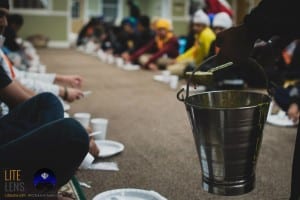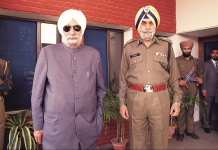

 Ever since I can remember, I’ve been sitting on Gurdwara stages with my father – playing tabla, harmonium, or crying in my mother’s lap. Appearing on stage often meant we were constantly under the spotlight and given plenty of attention from sangat. Uncles and aunties frequently came up to me to give compliments on my tabla playing, since I was so young. Almost everyone knew who we were, and many people would meet or greet me with love because I was the son of a Bhai Sahib. We were constantly given respect by the sangat, due to our being at the forefront of the scene.
Ever since I can remember, I’ve been sitting on Gurdwara stages with my father – playing tabla, harmonium, or crying in my mother’s lap. Appearing on stage often meant we were constantly under the spotlight and given plenty of attention from sangat. Uncles and aunties frequently came up to me to give compliments on my tabla playing, since I was so young. Almost everyone knew who we were, and many people would meet or greet me with love because I was the son of a Bhai Sahib. We were constantly given respect by the sangat, due to our being at the forefront of the scene.
But today I would like to focus on someone else. Not the committee members, kathavachaks, or famous Raagis (all whom deserve respect and play vital roles in the Panth and Gurdwara ecosystem). Rather, today I would like to discuss the people who are left in the background. The average Joe (or Jeet) who spends hours doing seva but doesn’t get any fame, respect, or recognition. For the longest time, I took for granted just how complex it was to run the Langar in just one Gurdwara. Countless volunteers joining together to feed the sangat, with no personal gain in mind – now that is true selfless service. Every time I visit the Langar Hall, I see so many different faces – all pegs in this giant wheel, turning and churning to continue the operation of Langar. Just normal, random people, making rotis, washing dishes, rolling dough, setting plates and serving food. People of all ages, from little boys to old women and everyone in between.
The sevadaars who serve food in the Langar line are visible to the sangat, but the people washing dishes or cleaning are often hidden in the back. We all eat and put our dishes away, but how often do we think about what happens next? How would the system work without all of these people doing their part? Have we ever stopped and thought, if there weren’t enough volunteers, how would the dishes get washed?
On random days of week, at odd hours of the night, you can find people there, ever ready to serve. It amazes me that there is always someone who sees a pile of dishes and decides to take out his or her time to do something about it. The necessary tasks somehow always gets done, relying on random sevadars to come do them. There are times when no one is taking care of a seva and other times when there are so many volunteers that there is no space to join them! From dumping trash to mopping the floors, the Sikh spirit of seva is still alive. Seeing it always fills me with happiness and inspiration. These are the real heroes, wonderful selfless sevadars without whom the whole system would collapse!
It never fails to amaze me how random and mixed the group of volunteers is. They’re not all amritdhari or even kesadhari. Countless people who don’t fit the typical “Gursikh” image are always doing seva, vacuuming, rolling rugs, being involved and helping out. These people deserve the real praise and recognition. This is not the same as getting time on stage and showing how fancily you can play harmonium, how vocally skilled you are or what bols you can play on a tabla, activities which are usually followed by praise or compliments. In fact, most of the background sevas don’t come with any credit or recognition. There is a reason Guru Gobind Singh Ji told Bhai Nand Lal to wash the dishes of the Khalsa, why Gursikhs often advise us to dust the shoes of Sangat. Sevas like these are meant to keep us humble.
Whatever our motivation may be, ego usually tries to poke its head in. That’s why many people try to do seva in private. To be honest, I often face an internal struggle between not wanting anyone to see me while at the same time secretly hoping someone will! It’s tough not to become egotistical once you start doing a lot of seva. Something that is supposed to create a sense of humility can also give rise to more ego. In order for it to be truly fruitful, it is important for seva to be done without ulterior motives or expectation of rewards. It is even more beneficial if one were to do Simran at the same time.
I always wondered, what is the motivation and drive behind it? Why do people do it? And let me tell you, the only way to find out is by trying it yourself. It’s an amazing feeling, standing side by side with a stranger, with the same purpose and goal: to be one of many in this huge effort. No obligations, no expectations. I can say from personal experience that the feeling of peace and contentment you get doing seva is incomparable. Just knowing that you are doing something, however small, is satisfying. The contentment and sense of purpose I get from it is just.. I’ve never felt that anywhere else. And I’ve barely done any seva in my entire life!
Now, getting to the title of this post:
We’re all familiar with the famous Sikh Slogan “Degh Tegh Fateh”. Notice that the word “Degh” comes first. The Degh part is just as important to victory as the sword, or the warrior (sipahi) spirit. This means victory to the “cooking pot”, representing the concept of feeding and serving the community, making sure everyone is well fed in addition to providing protection and being politically victorious.
Over 500 years ago, Guru Nanak Dev Ji made the best investment of all time with only 20 rupees. To this day, that true bargain is paying off for the thousands who are getting fed around the world through the institution of Langar. If that’s not a good deal then I don’t know what is! People in all parts of the world are sitting together like equals and eating meals every single day, for free, all thanks to Dhan Guru Nanak Dev Sahib Ji.
Those who kept the Langars going and kept the Khalsa Army fed played a vital role in our Panth’s history. I say unsung heroes because we tell tales and sing ballads about the bravery and valor of our heroes who wielded the sword, but what about those selfless Sikhs who fed and served the Khalsa? The Sikhs who did seva in the Langar, like Bhai Manjh? Who sacrificed their families, comfort and personal health for the Guru’s institution of Langar? Sikhs like Bhai Taru Singh who gave up their lives for the Khalsa? For the amazing Khalsa Langar, where royalty and highly educated people like Bhai Nand Lal washed away their egos and purified their mind. That same Langar where emperors had to come sit at the same level as common people. Dhan Guru Ka Langar which even the enemy was welcome to come partake in!
It really humbles me to see kids, couples, families, and seniors on random days all cleaning the dishes. The feeling they get upon seeing a pile of unwashed plates, with no one there washing them, that feeling of shared responsibility, that, “Yes, I want to do something, to contribute, to make a difference.” The thought that “I’m willing to stick my hands in a sink full of yellow water and people’s leftovers rather than go home 15 minutes early.” It is very inspiring. It gives me hope. There is something glorious about it.
These are real heroes that we don’t acknowledge. But then again, maybe that’s what makes it special. There is something magical about coming outside and seeing all the shoes arranged in a neat line without knowing who did it. Perhaps recognizing these people and giving them awards would ruin it and take it all away. If you do these sevas, I salute you. If you truly serve, selflessly, I respect you. You are hundreds of times better than me and perhaps many others who preach from stages. And if you don’t, you should try it sometime. It’s an amasingh feeling.




